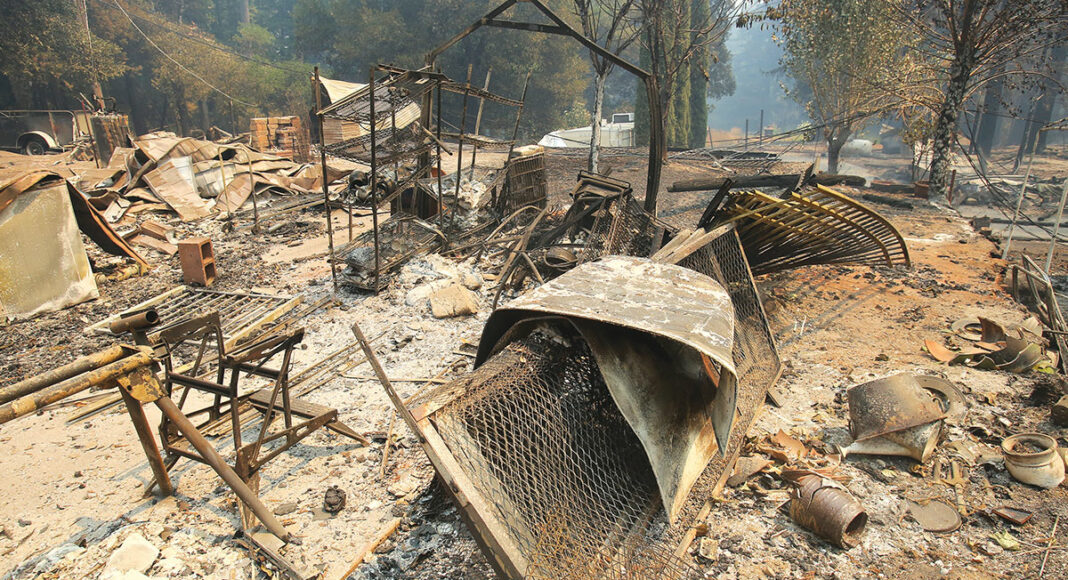EDITOR’S NOTE

It’s going to take a long time to know all the long-term effects of the CZU Lightning Complex fire on the Santa Cruz Mountains and what they will mean for the future. But Liza Monroy’s cover story this week opens with one family who—after evacuating their Boulder Creek home in the fire and being warned of the likelihood of mudslides that could force them to evacuate again—felt they knew enough already. They packed it in and moved out of the area.
Last year, GT reported about the emerging phenomenon of climate refugees, but Monroy’s story adds another level of nuance: How will the possibility of an area becoming a climate-change hot spot affect its community?
The answer, as Monroy reveals, is complex. There has always been a strong sense of place and identity within our mountain communities, and many residents are committed to staying. Some will undoubtedly wait to see just how much the cycle of wildfire danger and storm danger intensifies. And it’s all complicated further by a huge boost—which some readers will find surprising, given recent events—in demand for Santa Cruz Mountains homes. This is a subject we are likely to be talking about for years, but our story this week is a fascinating snapshot of the conversation at a key moment in time.
STEVE PALOPOLI | EDITOR-IN-CHIEF
LETTERS TO THE EDITOR
Read the latest letters to the editor here.
ONLINE COMMENTS
Re: Losing the Monarchs
Although I applaud this article for bringing awareness around the plight of the western monarch, especially with regards to habitat destruction, it should be noted that Xerces’ recommendations and thoughts about planting milkweed in coastal communities is opinion and not based on science. There is research being done on this subject and Xerces’ opinion is considered somewhat controversial. Please consider offering another side to this before locals start ripping out their milkweed!
— Adriana Gores
PHOTO CONTEST WINNER
About this Event
We live in an incredibly diverse area, but local leadership in the environmental sector does not reflect this population. At this meeting we will hear from a panel of local environmental leaders from different backgrounds about their personal paths, and what they see as the challenges and opportunities in our region for increasing representation in environmental leadership.
Join our discussion with three inspiring local leaders:
Shanta “Shay” Franco-Clausen, who serves as director of the Santa Clara Valley Open Space Authority, Director of Gender and Equity Santa Clara County Central Democratic Committee and more.
Yiwei Wang PhD, Executive Director of San Francisco Bay Bird Observatory
Violet Saena, Resilient Communities Program Director
Submit to ph****@go*******.sc. Include information (location, etc.) and your name. Photos may be cropped. Preferably, photos should be 4 inches by 4 inches and minimum 250dpi.
GOOD IDEA
THREE DECADES OF THEATRE
The African American Theatre Arts Troupe (AATAT) at UCSC invites the public to a free online gala celebrating the troupe’s 30th anniversary on Saturday, Feb. 20, 6-8pm. The event is open to the public and will feature national leaders of Black theatre, including award-winning theatre director Woodie King Jr. Those wishing to attend the gala must RSVP to ca***@uc**.edu by Wednesday, Feb. 17.
GOOD WORK
WORD OF MOUTH
Only 31% of Santa Cruz residents on Medi-Cal visited the dentist last year, but on Feb. 4, the county recognized four people who are working to improve that number—and overall oral health in low-income communities. These “Oral Health Heroes” include former mayor and member of the Oral Health Access Steering Committee Cynthia Matthews; Alicia Fernandez and David Brody of First 5 Santa Cruz County; and writer, advocate, and dental hygienist Noel Kelsch.
QUOTE OF THE WEEK
“Some people don’t like change, but you need to embrace change if the alternative is disaster.”
-Elon Musk














